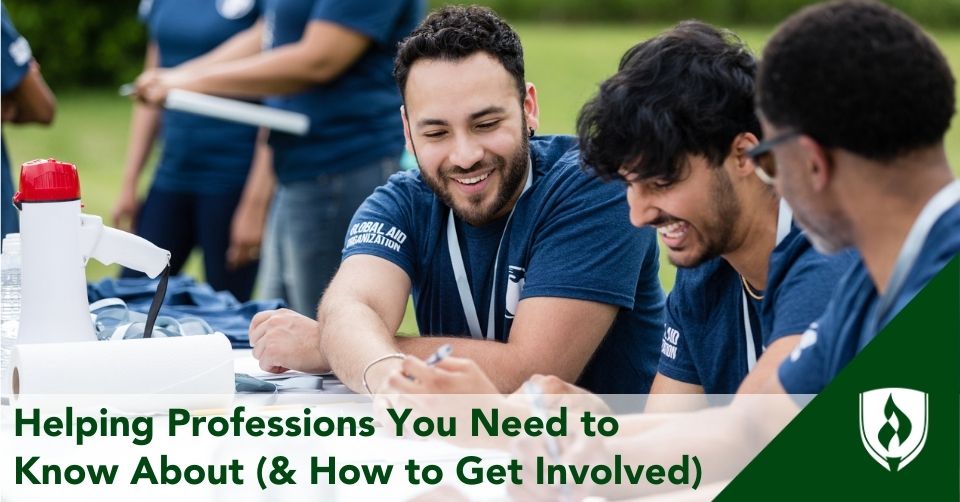
Do you have a passion for helping others? Are you looking for a rewarding career that does something good in the world?
Imagine being part of a profession where your primary goal is to uplift and support individuals and families, addressing their basic needs and overall well-being. Whether in schools, hospitals or community centers, helping professionals are everywhere, and they play a crucial role in shaping lives.
What career paths come to mind when you think of helping professions?
Think about the mental health professionals you might encounter, for example. Have you ever considered how a clinical psychologist, family therapist or student counselor could help someone find emotional support and healing? Or consider the world of human services, with everything from child protection work to community health and social work initiatives. There are full-time professionals out there who help people recover from addiction, find housing and find safety.
Today, helping professionals are needed in so many different fields. We need healthcare people. We need mental health services and community support.
But even on top of the need—helping professions offer a great deal as careers. Each career path offers unique, fulfilling opportunities for individuals who want to make a positive impact on their communities.
So, how do these helping professionals get started in their respective fields? What are some of the skills they need? What are their educational backgrounds?
Just keep reading to find out! We’ll look at several career paths that involve making a meaningful difference to people's lives.
Please note, Rasmussen University does not offer any programs that lead to the career opportunity of addiction recovery professional, clinical psychologist, occupational therapist, physical therapist, emergency medical services personnel, response teams or firefighter. It is important to check the education, certification, licensing and work experience requirements with state professional licensing agencies before you pursue any of the listed careers.
5 Fields full of helping professions
Helping professions encompass a wide range of careers, including numerous roles in health and education services. These careers focus on supporting others in various capacities—and creating positive impacts on local communities.
1. The field of mental health
Our mental and emotional health directly affect our overall wellness. Just like check-ups and vaccines help to support physical well-being, mental health services help to support healthy thoughts and emotions.
The mental health care field includes both generalists and specialists.
Addiction recovery professionals
Addiction is powerful and deeply misunderstood. It can also lead to damaged families and communities, detrimental health outcomes and genuine danger. People need assistance to recover from addiction, and the professionals who help them heal are also helping entire networks of friends, families and community members, all of whom can be harmed by a loved one's addiction.
For more on what these careers are like, check out: 5 Careers in Addiction Recovery For People Who Want to Save Lives.
Clinical psychologists
These experts delve into the complexities of the human mind. They provide counseling services and diagnose and treat mental health conditions for their clients and patients.
Clinical psychologists work closely with patients to develop treatment plans tailored to each person and their needs. This counseling and support helps patients navigate mental health emergencies and improve their overall quality of life.
Can you see yourself as a marriage and family therapist? Or a mental health counselor?
Entering the field often involves completing a Master’s degree program. Additional training includes supervised, hands-on work in a clinical setting.
Rasmussen University’s Human Services Associate’s degree and Human Services Bachelor’s degree programs are not designed to meet and do not meet the educational requirements for professional licensure as a therapist, counselor, social worker, psychologist, or other similar licensed careers in any state.
Psychologists can also go into therapeutic environments. They might work with children, youth and older adults, providing resources and guidance to help improve their lives.
2. The field of social work and human services
Social work and human services is a dynamic field that advocates for individuals, organizations, schools and communities by addressing social issues. Professionals in these fields often step in to fit gaps in the societal net.
Careers in this field range from requiring advanced education and licensure, such as that of a licensed social worker, to roles that can be done with a high school diploma (and everything in between).
Social workers focus on serving vulnerable populations. Their work helps ensure access to essential resources like food stamps and childcare. They also often engage in school and community programs to promote education and health services. But they aren't the only career options here. Social workers assistants, family services workers and human services assistants are also powerful helping professions.
People working in the social work field will often dedicate their work to areas like...
- Food assistance
- Housing assistance
- Disability assistance
- Healthcare advocacy assistance
- Unemployment assistance
- Education assistance
- And all types of assistance when it comes to helping people find resources
3. Public health professionals
Public health professionals focus on community health (as opposed to focusing on individual patients). They work to improve and protect populations’ physical and mental wellness. They analyze health trends, implement educational programs and develop policies to address health disparities.
This field is becoming increasingly important as communities face countless challenges surrounding infectious diseases, substance abuse and overall health education.
Much like social work, this field can involve professionals with advanced degrees, such as a Master's degree in Public Health. And it also includes helping professionals with certificates, associate degrees and bachelor's degrees.
Take a look at some of the choices for helping professionals at What Can You Do With a Public Health Degree? Exploring Your Options.
4. Nursing professionals
The health care world depends on nurses.
Licensed practical nurses (LPNs) pretty much keep nursing homes and many outpatient clinics running.
Registered nurses (RNs) handle everything from direct patient care to health education. RNs can also work in a range of settings, from hospitals to schools, where they address both mental and physical health care needs.
Additionally, many nurses pursue specialized trainings. For example, RNs can complete mental health certifications to develop new skills and further assist the patients they work with. They can also complete advanced degrees and work as primary care providers in a clinic and beyond.
Understanding all the different roles nurses can choose is honestly bewildering. Here's a quick overview if the time-honored helping profession of nursing calls out to you, A Beginner's Guide to Understanding the Levels of Nursing Credentials.
5. Education professionals
Teachers, preschool coordinators, early childhood education experts and more all help support students' personal and academic growth.
These professionals provide education services, guidance and resources to students to foster their development and help them navigate various challenges. They may also address issues related to mental health, especially in stressful environments.
In the realm of early childhood education, the needs of education go far beyond managing classroom behavior or teaching a great curriculum. ECE teachers also build relationships with family members, educate parents about early childhood development and provide a place of safety where young children's needs are met.
When resources are scarce, a safe place where children can be nurtured, fed and guided into strong emotional, physical and cognitive development truly saves its community. Any helping professional who helps to run, resource and work in a childcare center could tell you--there's nothing like the rewards of this role.
And it matters on many different societal levels. For example, imagine how many people would be unable to work without childcare?
Check out 5 Reasons the Importance of Early Childhood Education Is Impossible to Ignore.
Other examples of helping professions
We would be remiss to not mention the public safety, emergency and other health care personnel who’ve also dedicated their careers to serving others.
Helping professions can take many forms, including the following areas:
- Occupational therapy
- Physical therapy
- Emergency medical services
- Law enforcement1
- Firefighting and emergency response teams
- Community organizing and activism
- Youth work
- Crisis intervention
- Veteran affairs
Every helping profession that goes into those fields improves the lives of individuals and families by getting care, support and resources to those in need.
What qualities and skills do helping professionals typically need?
Each helping profession requires specific educational training and credentials. Still, there are several skills and traits that helping professionals should develop.
Compassion and empathy
Most people in the helping professions want to help people. But this skill goes beyond your intentions.
Demonstrating emotional intelligence and being sensitive to clients’ feelings and experiences is crucial. Compassion and empathy help professionals foster trust and build strong therapeutic relationships with the people they help.
Resilience and stress management
Burnout is real. And it's especially prevalent in fields where people regularly face the suffering of other human beings.
The ability to cope with clients, colleagues and community members is a must. This takes resilience on your part, along with habits to support your own emotional and physical well being.
Collaboration and communication skills
Collaboration is also key in most helping professions. While you may find roles that aren't client- or patient-facing, you are unlikely to find a position that doesn't involve collaborating with others, whether that's people in your own team or organization or beyond.
The ability to convey information clearly is also vital, whether preparing written reports or speaking with clients.
Problem-solving and critical thinking skills
Helping professionals often encounter complex situations. They must be able to think critically, identify problems and develop effective solutions tailored to each client’s unique needs.
Depending on the area you work in, you might need to be resourceful. Many of these roles step into environments where funding is scarce.
Cultural competence
A helping professional must be able to recognize and respect cultural differences to best serve their clients. Cultural awareness also helps professionals connect with clients from diverse backgrounds and provide appropriate support.
A genuine respect for the people you help is important, and learning about how to respect their cultures, beliefs and preferences is a big part of that.
Ethical judgment
Helping others means being morally conscious, which includes setting professional boundaries and respecting clients’ confidentiality. In some cases, like in the mental health and healthcare fields, these rights are protected by law. In others, each helping professional is trusted to safeguard the information they might receive about the people they help.
What education do you need for a helping profession?
At this point, you might be noticing how broad these roles are. The good news is that there are many entry points into a helping profession.
If you need a career that you can start soon, without years of education, there are lots of options. Or, if you have the time and resources, you can earn a Master's degree and get to work in many of these areas at a high level.
Here are some examples you might wish to consider based on the time you can commit to your education.
As few as 18 months to 2 years2
An Associate's degree in Human Services can prepare you for many helping professions in the areas of social and community work. These roles might be that of a community service assistant, social services specialist, human services assistant, advocate and program assistant.
Or if you're drawn to healthcare, an associate's degree in the health sciences can prepare you to work as a surgical technologist, a medical assistant and more.
As few as 33 months to 4 years2
Earning a bachelor's degree can help you find roles in all of the helping professions listed above. Whether that's a Bachelor's in Nursing a social work degree or a bachelor's degree in health and wellness, you have lots of choices.
As few as 4+ years2
Advanced degrees include master's degree programs, doctorate programs and even post-graduate certificates. This is a good option for people who want to work in high levels of public health or as a nurse practitioner or nurse educator.
Helping professionals may also pursue ongoing education to stay current with best practices and emerging trends. Online courses, workshops and seminars can enhance skills and knowledge in specific areas, such as disaster response strategies and trauma-informed care.
Are you interested in the helping professions?
If you're ready to embark on a fulfilling career in a helping profession, here's a brief action plan to consider as you kick off your journey.
- Explore your interests: Research different roles in helping professions, such as counseling, public health roles, or careers in social work.
- Pursue education: Choose a relevant Bachelor's or Master's degree program from a reputable school that aligns with your career goals.
- Gain experience: Look for volunteer opportunities or internships so you can gain hands-on experience in your chosen field.
- Network: Connect with professionals in your desired line of work or a related field. Consider joining industry-relevant associations so you can attend social events and gain professional contacts. Many organizations host both in-person and virtual events.
- Continue learning: Stay updated on best practices and industry trends through additional training to enhance your skills.
These simple steps can create a meaningful path toward a fulfilling career in the helping professions.
Do you want to make a positive impact on others' lives?
Pursuing a career in a helping profession requires compassion, interpersonal skills and, often, a formal degree. Education can help prepare individuals for career options where they can truly help others—and make a difference.
So, has this discussion sparked your interest in becoming a helping professional? An advocate? A social service assistant?
Rasmussen University offers a range of Degree and Certificate programs that equip students with the skills, knowledge and hands-on experience necessary to pursue roles in the helping professions.
If you still need some inspiration, check out What Can You Do With a Human Services Degree for specific career ideas to research.
Rasmussen University’s Human Services Associate’s degree and Human Services Bachelor’s degree programs are not designed to meet and do not meet the educational requirements for professional licensure as a therapist, counselor, social worker, psychologist, or other similar licensed careers in any state.
1Rasmussen University’s Law Enforcement Associate’s Degree meets the educational standards established by the Minnesota Peace Officer Standards and Training Board (MN POST) for persons who intend to seek employment in Minnesota as a peace officer. The program does not meet the standards of states other than Minnesota. Rasmussen University’s Law Enforcement Academic Certificate is not designed to prepare graduates for any state-issued professional license or certification.
2Completion time is dependent on the number of transfer credits accepted and the number of courses completed each term.




